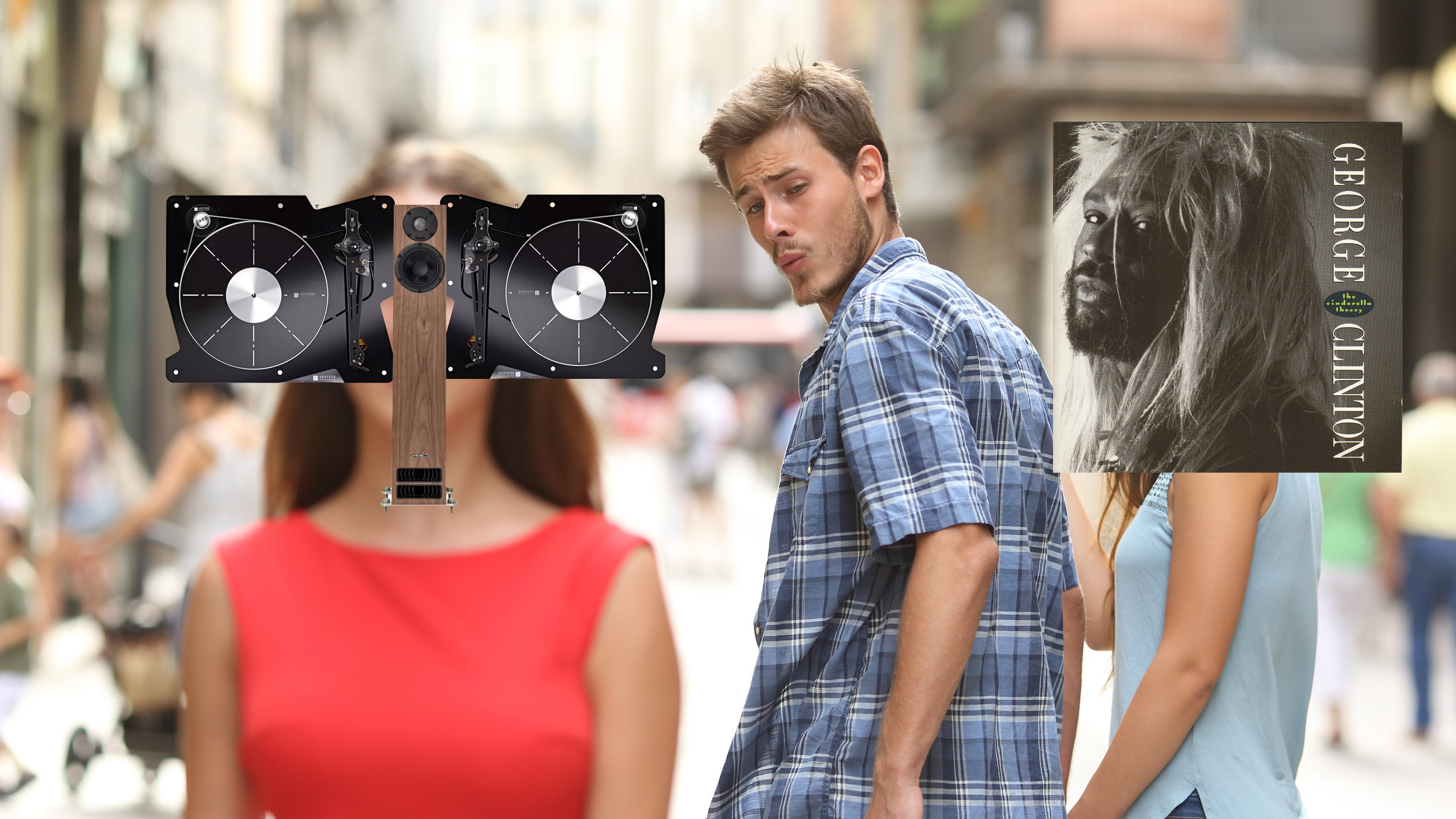If you’re more into hi-fi than music, that's a problem
Why there’s no such thing as a test track

The latest hi-fi, home cinema and tech news, reviews, buying advice and deals, direct to your inbox.
You are now subscribed
Your newsletter sign-up was successful
Always give your opinion piece an incendiary or inflammatory headline, and then follow that up with a provocative statement and a hardline stance you’ll spend the rest of the article attempting to climb down from:
There is no such thing as a test track, no such thing as real music and nobody takes your existence as self-appointed cultural gatekeeper at all seriously.
I’m not referring specifically to you, of course. But we all know someone to whom this does refer, don’t we? (If you don’t then please concentrate, because I probably am referring to you.)
Firstly, I have to raise my hands and admit my role in this circus of snobbery. I am a part of this industry, after all, which tends to celebrate machinery over art. I spend most of my time explaining why a lack of dynamic expression with this or that component makes it undeserving of your attention beyond my review.
I don’t even hide particularly well the part I play in the whole test track phenomenon, to be honest. I’ve written literally tens of articles listing them and my name is on the top of every single one.
But if there is a hill I’m prepared to die on, it is that music cannot be treated as a science. Music is vital, and it is to do with the soul. Not forgetting that is the key to doing this job.
- Missed the What Hi-Fi? Virtual Show? You can still register and watch all the sessions until 24th May, completely free of charge.
Cleanliness is not always next to Godliness

So I suppose it’s worth distinguishing between what I refer to as test tracks in those articles, and what I mean for the purpose of this one.
The latest hi-fi, home cinema and tech news, reviews, buying advice and deals, direct to your inbox.
When I test an amplifier or pair of speakers, I have to use music. There’s no real way around that. So by definition there are test tracks, but their only defining feature is that they are music. Some highlight certain aspects of sound better than others, and that is what I try to get across when making suggestions, but mostly I’m just trying to share music I like. The most important point is that those lists are varied.
What I can’t abide is the idea that there are tracks that can and tracks that can’t be used for testing hi-fi. That only the very cleanest recordings, or those of a certain genre, are capable of telling us how well a piece of equipment is performing.
Testing a pair of speakers, for me at least, is only about whether they allow that music to speak. And if I can’t hear the music, metaphorically I mean, then further listening is required to find out why not. But that most important aspect invariably reveals itself almost immediately.
In fact, using only one type of music while tuning something is a common pitfall of even the most experienced engineers and designers. That’s because it forgets why we have a pair of speakers, or an amplifier, or a CD player. It is as a mouthpiece only.
It is not the lungs, nor the voice box, nor the brain figuring out what to say. That is all to do with the music; and that means any music. There is no hi-fi music, there is no real music, and there isn’t even good music; there is just music.
So, who is it with whom I’m actually arguing? Well there are some people like this inside the industry, of course, though they only reveal themselves really when a product they’ve created or a brand they represent has received a less favourable review than hoped for.
To make this point, I once referenced the same piece of music in a five-star review that had caused great consternation when used in a four-star write-up for the same brand, and heard nothing about its unsuitability second time around. Petty, yes, but the legs of this high horse could not have grown themselves.
I am also speaking to a small section of some of our readers. Or, at least, I am talking to certain people who comment on our articles and on social media; I know that actually reading an article beforehand is not truly a pre-requisite when one aims to have an opinion.
I do read those comments though because, as much as I enjoy being abrasive, I am also extremely sensitive and want to make you all happy. I am also genuinely interested in finding out what you have been listening to, and what you’d add to various lists. What I’m not interested in is why the production of certain records is not good enough for testing a headphone amplifier, as if it is the job of the music to make the kit sound good rather than the other way round.
A wider problem

Still, it is quite a trivial nuisance to be so animated about; I’ll give you that. But I think the reason I am so is because it’s symptomatic of a larger problem of pretentiousness present among so-called music fans.
The idea of music as a meritocracy makes me nauseous. And those who consider their tastes better or more refined than others, or any more worthy of note due to some arbitrary parameters, can quite honestly miss me with their nonsense.
I will make a couple of concessions. There is, I understand, objectively bad music. Anybody who has given up time to attend a child’s recorder recital frankly deserves some kind of tax relief. And I’ve played enough gigs in empty halls to know the majority of unsigned bands make their contractual status abundantly clear within a few bars of their opening number.
It is fun to make sweeping statements about music, too. And sometimes, despite being hugely reductive, those also end up being true. All 80s pop songs sound like Christmas songs, for example. But the concept of real music or good music almost constituting a separate genre is as excruciating as it is insulting.
That said, we all know immediately what someone listens to when they opine as such, don’t we? It’s either things with guitars – usually from the 1960s to 1980s, with a smattering of more modern bands they believe to share the same influences, but never anything more brusque than Led Zeppelin – or it is western classical.
Rarely, if ever, are they referring to music that wasn’t created either at the time or within the culture in which they grew up, or fed to them at an early age. For the record, in twenty years these types of people – currently teenagers – will be saying the same thing when referring to trap and drill, and they’ll be equally as wrong.
Bach, Beethoven, Pink Floyd and Dire Straits: all real music, yes, but not even beginning to scratch the surface of the art form, or what you could hope to put forward as definitive.
The duty of a music fan

You don’t have to listen to every type of music, of course, and you are allowed narrow but very intense tastes. I’m not trying to be a hypocrite; I’m attacking an attitude, not anyone's musical palate.
Because of course it gets continually more difficult to find music you like. And that’s the case for everyone, since music began. Nothing is going to hit you now in the same way your favourite artists did when you were 14 years old. Nothing will ever be so immediate, nothing will ever be so fresh.
But then you’ll probably remember your elders at the time telling you just how awful that music was, how it was derivative and who came up with it first. And hopefully, if you were any sort of 14-year-old at all, you’ll have told them where to go.
It’s okay to be that kind of adult now, too. You can’t be expected to bite your tongue each time a new act is just a little overly inspired by the band that helped shape your adolescent personality. But, just as younger generations don’t have to listen to Madonna to enjoy Lady Gaga, you have to remember things weren’t better or particularly that original back then either.
It boils down to having a kind of a duty as a music fan. If things aren’t hitting the same way as they did, you need to broaden your horizons. Instead of saying something isn’t real or good, look further afield until you find something different that you do like. Past a certain point in our lives, and certainly as more artists and genres clamour for our attention, we can’t expect music to just happen to us any more.
If you truly open yourself to all types of music, put in the work and still only like albums released by bands beginning with P, released in the first half of 1978, then fair enough. Nobody can question your diligence.
But remember, when you’re speaking to someone with differing tastes, what you like isn’t hi-fi music, isn’t real music and isn’t good music. What you like listening to is just music.
MORE:
Why not wash this down with a selection of our favourite test tracks?
